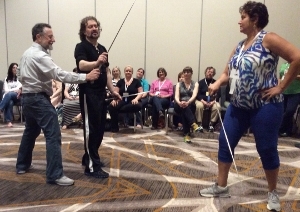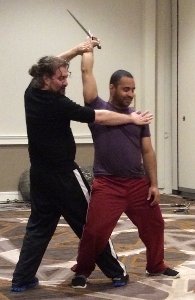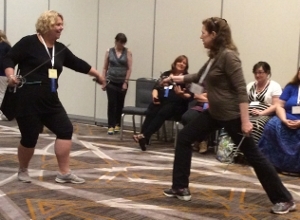Lea Wait's Blog, page 287
July 7, 2015
Living and Writing on the Coast of Maine
Lea here. And, for all of you who enjoy reading the Maine Crime Writers blog, have I got a book for you!
As many regular readers of this blog know, during the past fifteen years I’ve changed my life, in very positive ways. After ending my thirty-plus years in corporate America I moved to Maine, the state I’ve loved all my life, married the man I’d loved (but lived without) for many years, and began writing fiction full-time. This summer my fourteenth traditionally-published book 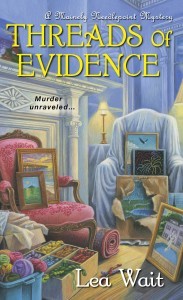 will be released (THREADS OF EVIDENCE, in late August.)
will be released (THREADS OF EVIDENCE, in late August.)
In the past several years I’ve written blogs for Maine Crime Writers and other sites, focusing on what it’s been like to live my dreams: live in Maine full time, and be an author … and the wife of an artist. 
In response to suggestions from a number of you, I’ve now edited, added to, and brought together 32 of the best of these blogs in one place. LIVING AND WRITING ON THE COAST OF MAINE is really a memoir. Starting with a celebration of my anniversary in October, the essays move through Christmas, New Year’s, winter storms, mud season, and on to the joys of Maine summers.
I’ve chosen the selections carefully, based on my most popular blogs, and those that best defined my life now, and sometimes in the past. (We all have backstories.) Warning: they include a fair amount of wry humor.
Because many readers are also writers, or are curious about writers, I’ve also included 25 essay on writing the cosy mystery, doing research, what author signings are really like, how to create a character bible for a book, experiences visiting schools, and other insights into how my life and my writing merge.
Available in both e-book and paperback, I hope you’ll enjoy this peak into living in Maine … and my life.
Lea Wait writes the seven-book Shadows Antique Print Mystery series, starring protagonist Maggie Summer, and the Mainely Needlepoint series, which began with TWISTED THREADS last January. The second in that series, THREADS OF EVIDENCE, will be published in September. She also writes historical novels for ages eight and up set in 19th century Maine.
July 6, 2015
Woman with a Dagger
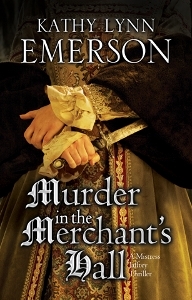 Kathy Lynn Emerson (aka Kaitlyn Dunnett) here, to share some of what I learned in the three-hour Rapier/Dagger/Smallsword Workshop at the Historical Novel Society’s North American Conference in Denver last month. This opportunity came at an extremely good time for me, as I’m about to start writing the third book in my series featuring Mistress Rosamond Jaffrey, Elizabethan sleuth and sometime spy. When I developed the character, in Murder in the Queen’s Wardrobe, I gave her two knives to carry for protection, one sheathed in her boot and the other hidden in a special pocket inside her cloak. Beyond establishing that she knows how to use them, both for stabbing and for throwing, I haven’t had her do much with them in the first two books in the series.
Kathy Lynn Emerson (aka Kaitlyn Dunnett) here, to share some of what I learned in the three-hour Rapier/Dagger/Smallsword Workshop at the Historical Novel Society’s North American Conference in Denver last month. This opportunity came at an extremely good time for me, as I’m about to start writing the third book in my series featuring Mistress Rosamond Jaffrey, Elizabethan sleuth and sometime spy. When I developed the character, in Murder in the Queen’s Wardrobe, I gave her two knives to carry for protection, one sheathed in her boot and the other hidden in a special pocket inside her cloak. Beyond establishing that she knows how to use them, both for stabbing and for throwing, I haven’t had her do much with them in the first two books in the series.
That’s about to change.
The dagger pictured on the cover of the second entry, Murder in the Merchant’s Hall (December 2015), is too large to be one of Rosamond’s concealed weapons, but compared to the daggers used in what is called “rapier and dagger fighting,” it’s not that big, either. This was the style of fighting taught to men in the sixteenth century. I’d read quite a bit about it, but until the workshop I’d never had the chance to see it demonstrated up close and personal, let alone an opportunity to actually handle the blades and practice some of the footwork and wrist movements involved.
Several of the points made by instructor David Blixt seem likely to apply to the situations Rosamond will encounter in the next novel, even though she will probably not engage in two handed fighting herself. What follows are some examples of advice I hope she’ll take to heart.
*Using a blade requires constant training and drills to create muscle memory and dancing is one of the ways men train for fighting with rapier and dagger.
*Force your opponent’s body to bend in the direction it wants to go to throw him off balance.
*Adrenalin is not your friend. You have to keep thinking and be measured and calm.
*Making noise, such as shouting or swearing, while you fight is to remind yourself to breathe. Holding your breath will get you killed.
*Hit with the forearm, not the hand. The hand has too many bones.
*Gloves protect the hands and can knock away a blade.
*Fights are usually very short.
*Left-handed people either learned to fight right-handed or fought left-handed and were mocked. But the left-handed fighter had the advantage of being able to make unexpected moves.
*The dagger (in the off hand) defends and the rapier attacks, but it is possible to seize an opportunity and attack with the dagger.
*In fighting, use joints rather than muscles because muscles tire.
The illustrations above were taken during the workshop. Since I was the one taking them, I’m not in any of them. Probably just as well. Arthritic fingers and ankles do not lend themselves to the necessary moves, although I was able to do enough to get a feel for the process. I also used my iPad to shoot brief videos of parts of the demonstration. I expect these clips will be very useful if Rosamond’s husband Rob, or any other male characters, end up fighting with rapier and dagger in Book Three. Rosamond may even toy with the idea of taking lessons in sword fighting herself and ask Rob to teach her, although I expect she’ll decide to stick to smaller blades.
There will definitely be a scene in which she is practicing throwing her knives at a target.
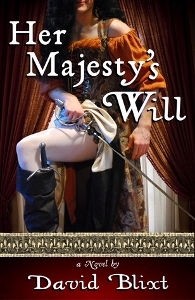 I can’t close without saying a few more words about David Blixt. In addition to being a gifted teacher, he is also a stage actor and a writer. Although I generally avoid reading other people’s fiction when it is set in the sixteenth century, I couldn’t resist buying his Elizabethan novel, Her Majesty’s Will. Picture Shakespeare and Marlowe, before they became playwrights, as two very inept spies.
I can’t close without saying a few more words about David Blixt. In addition to being a gifted teacher, he is also a stage actor and a writer. Although I generally avoid reading other people’s fiction when it is set in the sixteenth century, I couldn’t resist buying his Elizabethan novel, Her Majesty’s Will. Picture Shakespeare and Marlowe, before they became playwrights, as two very inept spies.
Kathy Lynn Emerson/Kaitlyn Dunnett is the author of over fifty books written under several names. She won the Agatha Award in 2008 for best mystery nonfiction for How to Write Killer Historical Mysteries and was an Agatha Award finalist in 2014 in the best mystery short story category for “The Blessing Witch.” Currently she writes the contemporary Liss MacCrimmon Mysteries (Ho-Ho-Homicide, 2014) as Kaitlyn and the historical Mistress Jaffrey Mysteries as Kathy (Murder in the Queen’s Wardrobe, 2015). The latter series is a spin-off from the Face Down series and is set in Elizabethan England.
July 5, 2015
Maine crime writers just wanna have fun
Maureen here, getting some last thoughts in before I head off to Baxter State Park for a few days.
Writing is a funny business. Yes, it’s a business in that we write books and it’s important to sell them. But selling them isn’t primarily why we do this. A bunch of us Maine Crime Writers gathered Saturday to take part in the Belgrade Lakes Fourth of July extravaganza. And yes, we brought books to sell. But as the several hours we spent at the event made clear, a lot of the real fun of this business, besides writing the books, is meeting people and talking about writing and our books.
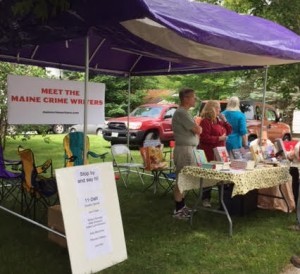
John Clark, Lea Wait, Kathy Emerson and Dorothy Cannell get ready as the Meet the Maine Crime Writers booth opens for business.
John Clark, Dorothy Cannell, Lea Wait, Kathy Lynn Emerson and Kelly McClymer, all of whom blog on this site, had a grand old time talking to those who stopped to say hi, and I think to a person we’d say that the books we sold during the event were just the gravy on what was a great day.
Speaking for myself, “getting rich” was never really the goal of becoming a published writer. It was also never the goal of my day job, newspaper editor. Both are things I wanted to do since I was 9 or 10 years old. Being from a newspaper family, I knew the journalism gig was never going to make me a lot of money. That prepared me for the reality of being a published writer, I guess. But money — or fame — never was a goal in the first place.
Those who are driven to write do it because they have something they want to say. I’m lucky that there are people out there who are interested in hearing it. I don’t think I’d change the message in order to get more money for it. In fact, I know I wouldn’t.
I could have written for a certain audience, sexed things up more, thrown in some vampires, if they’re still the rage. Maybe written a dystopian vampire-themed BDSM-
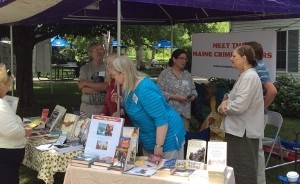
John, Lea, Kathy, Maureen, and Dorothy
tinged mystery thriller about a couple of PI/meth cookers who break all the rules and some heads in order to bring the bad guys (so I guess they aren’t the bad guys? These days, it’s hard to tell) to justice.
But my heart wouldn’t have been in it. I’ve read a lot of bad books in my life, and while they’re all bad in their own way, the lack of heart is obvious.
It was obvious to me from the way my fellow Maine Crime Writers talked about their books and their writing that they had heart Saturday. I think it was obvious, too, to those who stopped by to chat. Some of them even bought books.
July 3, 2015
Weekend Update: July 4-5, 2015
 Next week at Maine Crime Writers there will be posts by Maureen Milliken (Monday), Kathy Lynn Emerson/Kaitlyn Dunnett (Tuesday), Lea Wait (Wednesday), Barb Ross (Thursday) and Susan Vaughan (Friday).
Next week at Maine Crime Writers there will be posts by Maureen Milliken (Monday), Kathy Lynn Emerson/Kaitlyn Dunnett (Tuesday), Lea Wait (Wednesday), Barb Ross (Thursday) and Susan Vaughan (Friday).
In the news department, here’s what’s happening with some of us who blog regularly at Maine Crime Writers:
Don’t forget that today (July 4th) MCW regulars Dorothy Cannell, John Clark, Kaitlyn Dunnett/Kathy Lynn Emerson, Maureen Milliken, and Lea Wait, together with recent guest blogger Kelly McClymer, will be signing books from 11-2 at the Belgrade Lakes 4th of July Festival in Belgrade Lakes, Maine. For those who want to stick around, there’s also a frog jumping contest at 5PM and fireworks once it gets dark.
Here’s a look at our venue, ready and waiting. I’ll try to post pictures later in the weekend to show what it looked like with people crowding around to talk to us and buy our books.
Monday, July 6th at 7:00 p.m. Dorothy Cannell and Kate Flora will be at the library in Castine, sharing writing secrets, research stories, and where our characters come from.
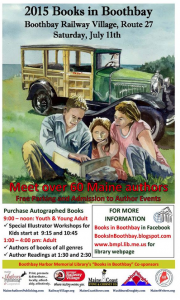 Next Saturday, July 11, is Books in Boothbay, held at the Boothbay Railway Village in Boothbay, Maine. Many, many Maine authors in all genres, including Maine Crime Writers. The morning is for children’s and YA books, the afternoon for the rest of us. (P.S. That means Lea Wait will be there all day — from 9 until 4.) Check here for more details. We’re likely to be giving away fun things, like books and cookie cutters (moose or lobster, anyone?) perhaps even a cool tee shirt from Liberty Graphics.
Next Saturday, July 11, is Books in Boothbay, held at the Boothbay Railway Village in Boothbay, Maine. Many, many Maine authors in all genres, including Maine Crime Writers. The morning is for children’s and YA books, the afternoon for the rest of us. (P.S. That means Lea Wait will be there all day — from 9 until 4.) Check here for more details. We’re likely to be giving away fun things, like books and cookie cutters (moose or lobster, anyone?) perhaps even a cool tee shirt from Liberty Graphics.
What’s your favorite Maine book? We’d love to hear what it is and why you like it. We recently heard from Mainely Murders Bookstore that their customers love the mystery, The Maine Mulch Murder, written by John Clark and Kate Flora’s late mother, A. Carman Clark. Rumor has it there may be another Amy Creighton mystery, The Corpse in the Compost, coming in the next year. If you’d like your own copy of The Maine Mulch Murder, share your favorite Maine book with us…and you could win one.
An invitation to readers of this blog: Do you have news relating to Maine, Crime, or Writing? We’d love to hear from you. Just comment below to share.
And a reminder: If your library, school, or organization is looking for a speaker, we are often available to talk about the writing process, research, where we get our ideas, and other mysteries of the business. Contact Kate Flora: mailto: kateflora@gmail.com
Meet Some Fellow Travelers
John Clark posting today
Regular readers of this blog do so for many reasons. They may be friends with someone who contributes, they may be lovers of mystery or lovers of Maine or they may simply like what we post. Whatever the reason, we’re thrilled to have them stop by. I’m sure that those of us who post here regularly also have blogs we love. As a young adult author, reader and reviewer, I’m always looking for something interesting and stimulating that relates to that genre. I’ve been a follower and pretty much a daily reader of one called YA Outside The Lines (YAOTL) (http://yaoutsidethelines.blogspot.com/) for quite some time. Not only do I get some interesting perspectives on how others approach writing YA fiction, but since the folks blogging there try to have a monthly topic (last month was theme parks), I enjoy how varied the takes are.

Holly says the sequel is in progress
Since blogs without readers risk becoming like the falling tree in the forest, I wanted to share this favorite of mine with MCW regulars, so I contacted Holly Schindler, the administrator and who has written some really great YA and juvenile fiction (her Playing Hurt is one of my all time favorites) and asked her about doing a profile. As you can see from what follows, she and several of the other members of YAOTL have come through in spades, so read on, consider checking it out regularly and enjoy. One quick reminder: If you’re in Belgrade tomorrow for the 4th of July festivities, make sure to stop by the Maine Crime Writers table. We’ll be there from 11-2.
Who started the blog and why? The blog was started by several authors with MTV books—they enjoyed blogging at the MTV site, but wanted to expand, reach out to some YA authors not necessarily being published by the same company. So YA Outside the Lines was born.
You inherited the blog—how has that gone? I know it’s a lot of work making sure blogs get up in a timely manner, even more so when you’re a writer. I always say I inherited the blog from Jennifer Echols. She was the administrator when I was asked to join. When her writing duties got to be too much, she needed to back away from blogging; I said I’d take over administrative duties. But really, there’s been very little work on my end. I shoot the bloggers reminder emails for their posts, and email the group in order to come up with a monthly “theme.” Then I just get to sit back and enjoy the posts along with everyone else.
How have posters been selected? New bloggers arrive in all sorts of ways. Sometimes they come to me asking to join, sometimes other bloggers at YAOTL will suggest new bloggers, sometimes I ask writers I meet. The only requirement is that they write (and are passionate about) YA lit.
What do you hope the blog accomplishes? I hope it introduces readers to some fabulous YA authors. I hope it provides some sense of community for both our bloggers and readers.
Funniest Post? Most unusual / embarrassing post? So hard to pick! You know, we let it fly at YA Outside the Lines—we talk about our writing journeys (full of bumps in the road), as well as our own teen lives (which are just ripe for crazy stories). You never know what you’re going to read next at YAOTL.
What do a few of your regular bloggers have to say about YA Outside the Lines?
Patty Blount: “OK, my two cents': YAOTL helps me feel like a real author. It’s hard to stay confident in this industry and hanging out with other writers who ‘get it’ makes me feel so much less alone. I’ve never met many of these authors but in a very real sense, they’ve become my family. Nothing Left to Burn is my fourth YA with Sourcebooks Fire and releases on 8/5!”
Jennifer Hubbard: “My first experience with YAOTL was as a reader–so many authors I admired were part of it. I loved the ‘pushing the boundaries of the genre and writing from the heart’ tagline, because that’s what YA is to me: A genre that’s constantly being redefined. Writing with emotional depth. I love reading everyone’s take on the different subjects we tackle. It’s like a mini-anthology every month.
Bio info: Jennifer R. Hubbard is the author of three YA novels, most recently UNTIL IT HURTS TO STOP, and a nonfiction book about writing, LONER IN THE GARRET: A WRITER’S COMPANION.”
Courtney McKinney-Whitaker, author of the historical YA THE LAST SISTER: “I think the best part for me has been “meeting” other writers, if virtually, and getting to know you all through your posts and comments. It makes a lonely job feel less lonely.”
Jody Casella, author of THIN SPACE: “I love being a part of YAOTL. I enjoy the themes each month– coming up with a post and reading the other writers’ approaches to the topics. But what I like most about the group is the sense of community. Writing is such a solitary activity. We’re plugging away, alone, on our laptops, and sometimes it can feel pretty lonely. It’s been nice to meet the people behind the books, people, who it turns out, are a lot like me, with kids and pets and dirty dishes and part-time jobs, people who are juggling writing and promoting, who are working and reworking manuscripts and always dreaming to get more of their stories out into the world. Many of the YAOTLers have become my friends over the past few years.”
Jennifer Salvato Doktorski, author of THE SUMMER AFTER YOU AND ME: “W riting is such a solitary craft that I’m happy to be part of a community of YA authors who understand that the day-to-day business of being an author isn’t always pretty. Some days/weeks/months are more intense than others and during those periods, I become very anti-social, often turning down invitations from friends and putting all non-writing related activities on hold. Reading the blog posts of my fellow YAOTLers, as well as writing my own post once a month, forces me to think about something other than the project I’m currently submerged in and makes me feel connected. I’m always inspired about what others post and often find myself expanding my reading list as well as following their advice about everything from writing a better sentence to decluttering my home.”
Natasha Sinel: “I have been a follower of YAOTL for years (and years and years), and it has been so inspiring to read the heartfelt posts during the long lonely stretch of working toward getting traditionally published.
What I loved about YAOTL as a follower was how different it was from other author blogs. First off, it was one of the first co-op blogs I’d seen, and I loved the monthly topics and how each author had something different to say. It was also different from other blogs because it was about craft and emotion. Most other blogs I followed were about querying, how to get published, etc. I loved seeing the inside look at authors’ writing lives. I remember dreaming of being an author and being a part of a site like YAOTL!
I also loved YAOTL as a follower because it introduced me to authors I wasn’t familiar with (like Holly Schindler whose A BLUE SO DARK really stuck with me). Once I finally got a publishing deal, I approached Holly for a blurb request, and not only did I get the most amazing blurb for THE FIX, Holly invited me to join YAOTL. I have loved writing my YAOTL monthly blog posts about interesting topics where I can dive into my feelings about writing, reading, life, being an author. And I continue to love reading my colleagues’ posts. My debut YA novel THE FIX releases September 1, 2015 from Sky Pony Press.” (NOTE: I’ve read an ARC of This and it’s a great book!)
How do you pick a monthly theme and can you say which have worked the best? I shoot an email to the group mid-month, saying it’s time to throw out some ideas for a theme. Many of our themes have been seasonal, some have been tied strictly to the writing industry. Our best themes have always been those that are the most open-ended (so that bloggers can still find something fresh to say at the end of the month). But we also usually find ways to tie even the most non-writing-sounding theme into our work…
What else would you like MCW readers to know about the blog? Just that we’re always looking to interact with new readers. Be sure to follow us at yaoutsidethelines.blogspot.com. If you’d like to suggest a monthly theme you’d like us to write about, you can always shoot me a message at writehollyschindler (at) yahoo (dot) com.
About Holly Schindler, YA Outside the Lines Administrator:
Holly Schindler is the author of four traditionally published books; her work has received starred reviews in Booklist and Publishers Weekly, has won silver and gold medals in ForeWord Reviews Book of the Year and the IPPY Awards, respectively, has been featured on Booklist’s Best First Novels for Youth and School Library Journal’s What’s Hot in YA, and has been a PW Pick of the Week. She recently became a hybrid author; FIFTH AVENUE FIDOS (contemporary adult humor) is her first independently published book. She is owned by a Pekingese named Jake and can be found working on her next book—PLAY IT AGAIN, the sequel to her YA romance PLAYING HURT—in her hometown of Springfield, Missouri. She can also be found at hollyschindler.com, @holly_schindler, and facebook.com/HollySchindlerAuthor For sneak peeks, giveaways, news, writing tips, and more, subscribe to her newsletter: tinyletter.com/hollyschindler.
July 1, 2015
Teach Her a Lesson
 Kate Flora: Summer is a great time to refill the well of creativity. A quick trip to L.A. for The Sound of Music sing-along at the Hollywood Bowl. Passing banks of roses at the edge of the sea and admiring the swaths of lupines along the Maine roads.
Kate Flora: Summer is a great time to refill the well of creativity. A quick trip to L.A. for The Sound of Music sing-along at the Hollywood Bowl. Passing banks of roses at the edge of the sea and admiring the swaths of lupines along the Maine roads.
Every summer I make the same vow: No, I will not teach. I will sit on my porch in an armchair and stare out at the sea and read books and play in my garden and work on a book and take it easy. And every summer, without fail, when I get the e-mail asking if I’d like to teach, I find myself saying yes. Why? Because, also without fail, spending three hours a week in a room full of writers is wonderful.
What do they teach me, you ask? What could they have to teach a writer who has been at

The cell phone flashlight app becomes magical at the Hollywood Bowl
this for thirty years and is working on her twenty-sixth book? In a nutshell–everything. Much in the same amazing way that having a small child teaches us to see the world anew, spending time each week listening to writers take the same homework assignment and give it a dozen individual spins reminds me of all the tools we bring to the table when we sit down to write, and the many ways we can wield them.
Language? You bet. This room has writers from all over the world, from different age groups, who work at different careers. They may all be doing a sensory isolation exercise where they go to a place and write three paragraphs of description, each using a different sense, but when they share their work, they will take us into many different places and firmly anchor us there. From the deadly serious to the highly comedic, their writing helps them to understand their distinctive voices and world views, and reminds me of the importance of choosing the best word. Of crunchy nouns. Of the challenges of describing smells or the tactile nature of surfaces. Of dynamic flow. I am awed–and jealous–as I listen.
Voice? Again, you bet. Stunning opening lines. Powerful contrasts. Undisclosed yet evident character. Simple descriptions that manage to reveal deep emotional connections.
Writerly choices are all over the place.
 How about a sense of place so powerful you can feel the blisters on your feet, the crunch of pine needles, smell the mingled scents of a summer commuter train or dining at an outside restaurant? How about an observing eye that makes things architectural? Or one that operates cinematically, beginning with the wide, establishment shot and then zooming in on the essence of the piece?
How about a sense of place so powerful you can feel the blisters on your feet, the crunch of pine needles, smell the mingled scents of a summer commuter train or dining at an outside restaurant? How about an observing eye that makes things architectural? Or one that operates cinematically, beginning with the wide, establishment shot and then zooming in on the essence of the piece?
Or a sense of taste so vivid the entire class is hungry?
Or combining three such different smells that each one is elevated, giving the piece more depth?
There are no rules about where the place must be, and their writing flows from dark, fraught interior spaces and the cramped immediacy of a car seat to towering trees twisting in the wind and the varied grays of stormy skies.
I think you get the picture. Every summer I break my vow and teach another writing class because there’s a kind of magic that comes from doing it. Magic in the many ways that different writers can write. And a reminder that as writers, we never have have this craft knocked. We’re always learning. A reminder that we all began with the blank page, and all of those endless editing heads, perched on our shoulders like a many-headed hydra, telling us we’ll fail. We won’t get it right. We don’t know what we’re doing. So part of the magic is watching writers shrug off those don’ts, and you can’ts, and you musts, and finding their way to their own writing practice.
of those endless editing heads, perched on our shoulders like a many-headed hydra, telling us we’ll fail. We won’t get it right. We don’t know what we’re doing. So part of the magic is watching writers shrug off those don’ts, and you can’ts, and you musts, and finding their way to their own writing practice.
So sorry, lonely white L.L.Bean chair. I’m not on the porch after all. I’m spending time being inspired by writers. Maybe next year.
June 30, 2015
Where Do You Find the Joy in Writing?

What part of the writing process gives you joy?
Since every writer’s process is different, and since we each take pleasure in different aspects of the craft, I asked the group at Maine Crime Writers this question: Where do you find the joy in writing? Below are their fascinating replies.
Maureen Milliken: I find the joy in actually doing it, and the more I write the more the story works itself out and becomes clear to me. The discovery part just blows my mind.
Chris Holm: Nothing gives me a bigger thrill than when my characters do something unexpected. I live for the moments they take over and surprise me. I suspect that’s why I’m not fond of outlining: I’m a junkie looking for a fix. I’d rather fly without a net than go a whole book without once getting that jolt.
Susan Vaughan: I sweat out the first draft, but seeing it come together as I get past the middle is a triumph. Even more, (don’t hit me), I find joy in the revision process, tweaking scenes and making the wording sing.
Lea Wait: Simply … I love making something (a story) out of nothing … or, perhaps, more correctly, out of bits and pieces of places, people, ideas, history, nature … it’s like making a patchwork quilt. Individually the pieces may be bright, or dull, or contrasting .. but stitched together in the right way they can become (when the quilt or story works) art. That’s always the challenge .. to find the right pieces and put them together in the best way possible.
John Clark: Since I’m not a plotter, most of my books and stories are created as I’m writing, so I’m entertaining myself and discovering things much like I hope readers will.
 Kathy Lynn Emerson: Good question, Kate.
Kathy Lynn Emerson: Good question, Kate.
Since I don’t plot much in advance, I’m always thrilled and energized when pieces fall into place and I suddenly know what happens next or why a character has been acting in a certain way. Those “ah-ha” moments can make my day.
Vaughn Hardacker: For me it’s those times when the story takes over and I just type along behind!
Dorothy Cannell: “…From being invited into the world of my characters and encouraging them to surprise me.”
Barbara Ross: I’m with Susan. I love revising. I love the feel of rounding the bend and seeing the finish line in the distance. I especially love it that when revising, so often you discover that somehow, during the first draft, you’ve subconsciously stashed characters, scenes and settings away for later, unaware of how critical they would turn out to be.
Brenda Buchanan: Hi Kate, great question. When I am writing I feel most like my true self. That is not to say I find writing to be easy. But it is my most comfortable psychic habitat, where I am most at home, and that brings me joy.
Jayne Hitchcock: Just writing brings me joy.
Kate Flora: I’m with Chris—it’s those surprises that I live for. Those moments when I 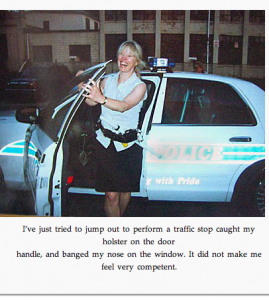 have a plan and my characters have another, and they simply take over. I also love those moments Barb Ross refers to when you discover that unconsciously you’ve laid the groundwork for how things will end up. And yes, Jayne and Brenda, just writing gives me joy. Especially first draft, when, as John notes, I’m discovering the story the way my readers will. And may I put in a plug for research? Making those discoveries that help bring my characters alive and give me the small, telling details?
have a plan and my characters have another, and they simply take over. I also love those moments Barb Ross refers to when you discover that unconsciously you’ve laid the groundwork for how things will end up. And yes, Jayne and Brenda, just writing gives me joy. Especially first draft, when, as John notes, I’m discovering the story the way my readers will. And may I put in a plug for research? Making those discoveries that help bring my characters alive and give me the small, telling details?
And now, readers and writers out there…please join the conversation. What brings you joy?
June 29, 2015
Strawberry Dreams
Hi. Barb here.
It’s finally strawberry season in Maine. We had a long, cold spring (okay, a longer, colder spring) and a long, snowy winter. Snow, it turns out, is good for strawberries because it protects them, and indeed, this year’s crop is delicious and super juicy.
 For me, strawberries are always the most welcome indication that summer has finally arrived. When I was a kid, my father’s parents owned a summer home in Water Mill, Long Island. On the last day of school every year, my grandmother would pick me and my brother up, and whisk us, along with her father, my great-grandfather, out to Long Island Expressway for two weeks at the beach. We always stopped along the way and picked up the first strawberries of the season. Some of them even made it all the way to the house, where my grandmother would prepare her special shortcake biscuits. (So special, the recipe was miraculously printed on the Biscuit box.)
For me, strawberries are always the most welcome indication that summer has finally arrived. When I was a kid, my father’s parents owned a summer home in Water Mill, Long Island. On the last day of school every year, my grandmother would pick me and my brother up, and whisk us, along with her father, my great-grandfather, out to Long Island Expressway for two weeks at the beach. We always stopped along the way and picked up the first strawberries of the season. Some of them even made it all the way to the house, where my grandmother would prepare her special shortcake biscuits. (So special, the recipe was miraculously printed on the Biscuit box.)
I love seasons, and I love things that are special because you can only get them in a certain season, for a limited time. Now that I’m a grown up, you can get strawberries at the supermarket almost all year round. Those berries don’t interest me.
But give me local berries straight out of the fields and I will eat them for three weeks straight, or however long they stay around. They’re precious, because they’re rare. And they tap our memories because we associate them with a time and a feeling.
 So enjoy, because, what, honestly, could be better?
So enjoy, because, what, honestly, could be better?
June 28, 2015
My Bathtub, My Refuge
This is Lea Wait, and no, I haven’t yet taken shelter in a bathtub – although I’ve heard they’re good places to be (empty) during a tornado. Handy information if, like one of my daughters, you live in Kansas. But here in Maine bathtubs perform simpler, more classic, functions.
I grew up in houses, both our winter home in New Jersey and our summer home in Maine, that had large, footed, bathtubs and no showers.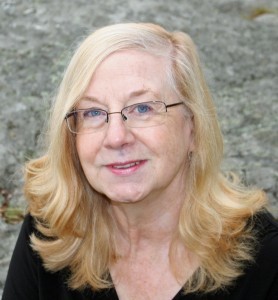
I don’t ever remember anyone asking for one. Our house was full as I was growing up: my parents, my grandparents, and my three sisters and I all managed (with the help of a set-in-concrete morning schedule) to stay clean with 1 1/2 bathrooms. Baths were taken at night, to speed up the morning ablutions, and my grandparents waited until all three girls and my father had left the house before venturing out of their bedrooms and claiming their bathroom time. It worked.
I first encountered serious showers in college, when I was faced with shared bathrooms with a dozen shower stalls and one bathtub per floor in my dorm. I showered, like everyone else. But I didn’t like showering. It was expedient, but nothing more. I longed for the reassurance and relaxation of a bath. I learned the hours that lone bathtub was apt to be available … and not filled with Jello or other strange substances. (It WAS a college dorm.) I managed to take a bath perhaps once every couple of weeks. I survived.
After college I lived in a series of apartments in New York City’s Greenwich Village. Two of them were equipped with both bathtubs and showers. I happily used the tubs. The third apartment, however, and the one I lived in the longest, not only didn’t have a bathtub, it didn’t have a bathroom. Oh, yes: it did have a toilet, in what had at one time been a closet, and it had a “step-up” metal shower in the kitchen, next to the set-tubs that were the only sinks. No air conditioning, of course, so I remember showering in July and stepping out into my kitchen and immediately dripping from more than the shower. And stepping out into an unheated apartment in winter when there were problems with the building’s boiler. About every six months I added more concrete to the base of the shower to keep it from leaking.
Showering was definitely not a luxurious or lengthy experience.
Somehow I didn’t mind. Yes, the shower was quirky. But I was living in Greenwich Village, on my own, and I loved my apartment. In addition to the shower in my kitchen I also had a nineteenth century pump organ I’d bought from a church in Maine that had upgraded to an electric organ. One table doubled as a place to eat and a place to write. My Olympic portable had a permanent place on it.
After my New York years I lived in houses, most equipped with one full bathroom containing both a tub and a shower. My daughters argued over shower times, but I used the tub. My nightly bath was one of the few times I could close a door and block out the world. Time alone was precious.
The house I live in now was built in 1774, but some time in the early twentieth century a bathroom was added, complete with tub. That tub is still there. It’s the same one my parents and grandparents used; the one I used as I child. I step into those warm waters and the world disappears. I get ideas for my books. I think through my day. I come to terms with the world.
When my husband first moved here, a man addicted to showers, he had to come to terms with the tub. At first sometimes he even drove twenty minutes to Boothbay Harbor to shower at the YMCA there. After several years we had a plumber install what he referred to as “an after thought” — a pipe from the tub’s faucet leading to a shower head above, so showers were possible. But the water pressure from our well wasn’t strong. And by then my husband had gotten used to taking baths. He rarely showers now. He’s been converted. (I firmly believe baths are addictive.)
He sometimes makes fun of me because if I have a headache or a stiff muscle or a stuffy nose, my first stop is the bathtub. I’ve explained that all my ills are better when I’m in warm water. That not only am I washing dirt and germs away, but problems, as well.
Maybe the world would be a quieter, more relaxed, place if everyone gave up showers for tubs.
Or maybe not. But, in my life, a bath tub is an essential.
June 26, 2015
Weekend Update: June 27-28, 2015
 Next week at Maine Crime Writers there will be posts by Lea Wait (Monday), Barb Ross (Tuesday), Kate Flora (Thursday) and John Clark (Friday), with a special group post on Wednesday.
Next week at Maine Crime Writers there will be posts by Lea Wait (Monday), Barb Ross (Tuesday), Kate Flora (Thursday) and John Clark (Friday), with a special group post on Wednesday.
In the news department, here’s what’s happening with some of us who blog regularly at Maine Crime Writers:
It’s a summer full of books and mystery!
An early-planning note that next Saturday, the Fourth of July, some of us (Maureen Milliken, Dorothy Cannell, John Clark, Kathy Lynn Emerson and Lea Wait) will be at a booth at the Belgrade Lakes Fourth Celebration, from 11 a.m. until 2 p.m., with books and pens in hand. Stop in, say “Hi!”, and take home a signed book. You know you need a beach (or lake) read.
The group will be set at 78 Main St., right in the middle of the festivities.
While you’re in Belgrade Lakes, stop by Day’s Store, favorite of locals and summer folks alike and check out, along with the best homemade doughnuts in Maine, their display of Maureen’s book, Cold Hard News.
alike and check out, along with the best homemade doughnuts in Maine, their display of Maureen’s book, Cold Hard News.
They asked Maureen if they could sell it after hearing about it from the Fourth of July organizers and other townsfolk. Nothing like marketing and word of mouth to get books in the hands of eager readers! Now let’s hope for a rainy summer in The Lakes so there’ll be lots of good reading time.
On a different early planning note: On July 6th, Kate Flora and Dorothy Cannell will be telling secrets at the Castine Library.
A note to our librarian friends: If you have a summer book sale coming up, let us know. We’d like to share that news here. Also more about your cool summer events.
Rumor has it there’s a mystery weekend being planned for the Jesup Library on the 18th of September . Of course there is the wondrous Books in Boothbay on July 13th, and on July 24th and 25th, there’s the Beyond the Sea Book Festival in Lincolnville, where you will find many of your favorite Maine Crime Writers.
Also on July 25th, at Richard Ford’s home in East Boothbay, from 2-5, the Maine Writers and Publishers Alliance will hold its 40th Birthday summer party. This is absolutely a “be there or be square” event with all the Maine writers you’ve ever wanted to meet, along with politicians, publishers, and luminaries of all sorts.
An invitation to readers of this blog: Do you have news relating to Maine, Crime, or Writing? We’d love to hear from you. Just comment below to share.
And a reminder: If your library, school, or organization is looking for a speaker, we are often available to talk about the writing process, research, where we get our ideas, and other mysteries of the business. Contact Kate Flora: mailto: kateflora@gmail.com
Lea Wait's Blog
- Lea Wait's profile
- 509 followers


